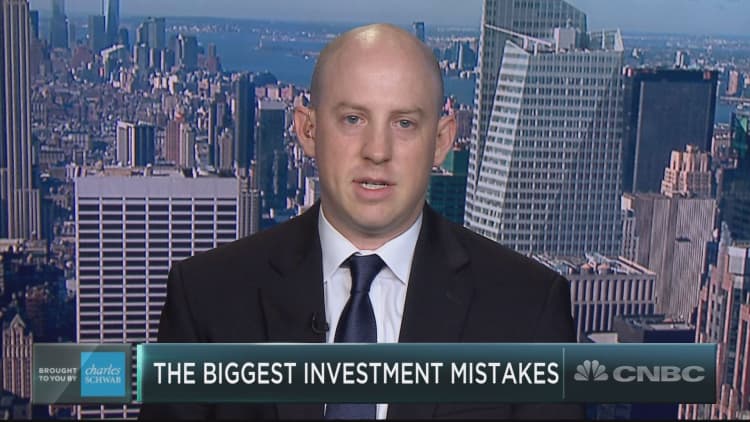
Every investor makes mistakes, even the Oracle of Omaha, Warren Buffett.
That's the investing wisdom Michael Batnick wants to impart.
Batnick, director of research at Ritholtz Wealth Management and author of "Big Mistakes: The Best Investors and Their Worst Investments," has pinpointed three of the most prevalent and perilous mistakes every investor has made.
Mistake #1: Overconfidence
One of the most common errors is not being aware of your own limits, he told CNBC's "Trading Nation" on Thursday.
"We all think we're above-average investors, which obviously cannot be true. So we overestimate our ability to beat the crowd, and then we also overestimate our ability to tolerate risk," he explained.
When the going is good, such as in the current bull market, he says, it's easy to imagine toughing out any downturn. To avoid panic-induced decision-making in the case of a sell-off, Batnick says to have a plan for failure.
"If you were too nervous in February at the bottom when stocks were in a healthy correction … probably you owned too much stock, and if you weren't nervous then you probably could own more stocks," he explained. "Past behavior in terms of how you behave is probably a good indicator of how much risk you could take going forward."
Mistake #2: Anchoring to purchase price
Giving too much importance to the price at which a stock was bought, rather than its current trading level, and having that affect trading behavior is also a common blunder, he says.
"You buy a stock at $100, and then it goes up to $101, or it goes down to $98, you view that stock through the prism of what you paid for it," said Batnick. "The $100 purchase price or whatever price you pay for it is completely irrelevant, and having that as an anchor is a really pernicious mistake."
Batnick says the best way to avoid this trap is to use stop orders as a line in the sand should the bottom fall out of a stock. He also recommends keeping individual stock selections to a small portion of a total portfolio so any losses are minimal.
Mistake #3: Learning the wrong lessons
Drawing the wrong conclusion from past mistakes can also negatively impact an investors' trading decisions, says Batnick.
"Past is not prologue and, of course, the problem with experience is that sometimes you learn the wrong mistake," he said. "You have this scar tissue built up of just the market is out to get you, so you blame the Fed, or you blame short-sellers, or you blame the investor base, whatever it is, and investors don't often take accountability for their own actions."
Batnick said he kept a trading journal during his time as a trader as a way to hold himself accountable and give context to past market events. It also allowed him peace of mind in distinguishing what was within his control and what was beyond it.






